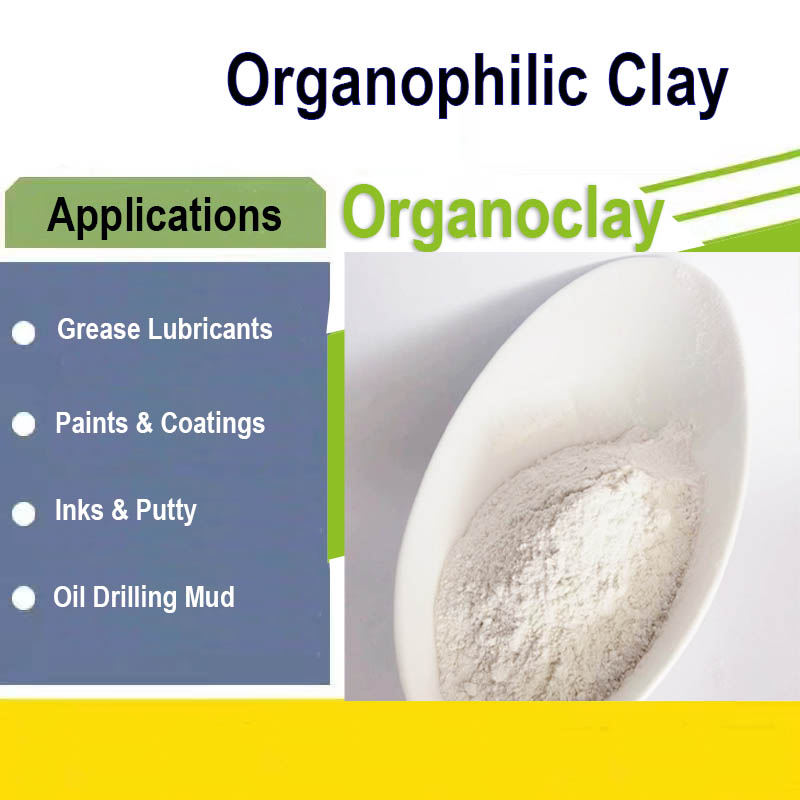Organoclays
When bentonite organoclay powder is incorporated into formulations, it acts as a thickening agent. It can improve viscosity and control over the flow characteristics of the material. The organoclay particles intercalate and disperse within the matrix of the material, forming a three-dimensional network. This network imparts structural integrity and viscosity.
Bentonite organoclay products also finds application as a viscosifier. These are substances that increase the viscosity of a liquid or material. The unique properties of organoclay allow it to function as a viscosifier by creating a network of interactions within the material, increasing its resistance to flow. This property is particularly useful in applications where controlled and uniform dispersion of solid particles is desired, such as in paints, coatings, adhesives, and drilling fluids.
For Drilling Mud
Drilling mud or drilling fluid is a crucial component in the drilling process. It serves multiple functions, including cooling and lubricating the drill bit, carrying cuttings to the surface, and controlling formation pressures. Organophilic clay is derived from natural clay minerals like bentonite. It is modified through a process known as organophilization. This modification involves replacing the native cations of the clay with organic cations. It results in a clay that has an affinity for organic fluids such as oil or diesel.
In drilling operations that employ all-oil or invert diesel fluids, where the continuous phase of the drilling mud consists of oil or diesel, organophilic clay products acts as a crucial viscosifier. When introduced into the drilling fluid, the organophilic clay particles disperse and interact with the organic phase, forming a gel-like structure.
Organoclay for Paints & Coatings
Incorporating organoclay products into paints and coatings improves viscosity. By modifying the structure and composition of hectorite clay through organic treatment, organoclay achieves a unique balance between thickening efficiency and ease of dispersion.
Pigments, which provide color and opacity to paints, have a tendency to settle at the bottom of the container over time. This settling not only affects the color consistency but also makes the paint formulation uneven and difficult to work with. Organoclay products acts as a suspension agent, creating a network within the paint that prevents or minimizes pigment settling.
Bentonite for Water Based Paints
Organoclay products like bentonite powder is widely used as a thickener in both solvent-based and water-based paints. When incorporated into paint formulations, bentonite acts as a rheological modifier. It improves the viscosity and flow behavior of the paint. This thickening property allows for better control over the application of the paint.
In solvent-based paints, bentonite prevents sagging or dripping during application, resulting in a more precise and controlled paint application process. In water-based paints, bentonite provides excellent thickening properties, contributing to improved consistency and stability of the paint. It assists in suspending pigments, preventing settling, and maintaining uniform color distribution throughout the paint.
Organoclays as Phase Transfer Agent
When organoclays are introduced into modification, it enables them to effectively transfer or distribute components between different phases. This phase transfer capability leads to a more refined and homogeneous microstructure within the blend. In the case of blends with droplets dispersed within a matrix, the presence of organoclays facilitates a more uniform distribution of the droplets, reducing their size and enhancing the dispersion.
With co-continuous morphologies, where two or more phases exist in interconnected networks, the addition of organoclay products leads to significant microstructural refinement. The organoclay acts as a facilitator for the transfer of components between the interconnected networks, ensuring better connectivity and distribution of the different phases. This refinement of the co-continuous microstructure enhances the blend’s mechanical strength, permeability, and other relevant properties.
Organoclay products that is used as a phase transfer agent are utilized in production of surfactants, emulsion polymerization processes, and in environmental remediation processes to facilitate the transfer of contaminants between different phases, such as soil and water.
Organoclay as Water Filtration Media
Organoclay products has proven to be a valuable water filtration media in various applications. It is useful particularly in the field of process and wastewater treatment. Its unique properties enable it to effectively reduce impurities and contaminants without undergoing significant swelling or clogging, making it an efficient choice for water filtration systems.
Organoclay products acts as a barrier that selectively filters out undesirable substances while allowing beneficial ones to pass through. The interlayer structure of organoclay provides a large surface area with numerous micro- and mesopores, which helps in trapping and retaining impurities. It targets specific impurities while leaving the desirable components unaffected. It has a high affinity for certain contaminants, such as heavy metals, organic compounds, and other pollutants, effectively removing them from the water.
Hydrocarbon Removal with Organoclay
Organoclay products, specially modified form of clay like bentonite, exhibits a high affinity for hydrocarbons. Its structure and composition allow it to adsorb and bind with hydrocarbon molecules, effectively removing them from the water.
Hydrocarbons can contaminate water sources through accidental spills, leaks, or discharge of oily wastewater. Petrochemical industry deals with the processing of hydrocarbon-based chemicals and products. Manufacturing processes of these chemicals involve the use of hydrocarbon-based solvents, oils, and lubricants.
Organoclay products as a hydrocarbon remover is used to treat industrial wastewater and remove hydrocarbons before discharge. Organoclay products are also used to remove hydrocarbons from wastewater to protect the environment, comply with regulations, conserve water resources, and maintain process efficiency. This prevents pollution, safeguard water quality, and mitigate the negative impacts of hydrocarbon contamination.
Rheology Modifiers
Manufacturers can achieve desired rheological properties. Organoclay products improve product performance and optimize the formulation for various applications. Organoclays as rheology modifiers offer versatility and control overflow characteristics.
Organoclay products can be used in low polarity, such as in non-polar solvents or low-polarity resin systems. It helps in improving the suspension and stability of solid particles, preventing settling and sagging in coatings, adhesives, and sealants. It is also suitable for materials with moderate polarity, such as medium-polarity solvents or resin systems. It provides effective thickening and anti-settling properties, maintaining uniformity and preventing sedimentation in paints, inks, etc.
Organoclay products is utilized in systems with high polarity, including polar solvents or highly polar resin systems. It exhibits excellent rheological control, promoting enhanced stability and preventing sagging in high-performance coatings, greases, and drilling fluids.

